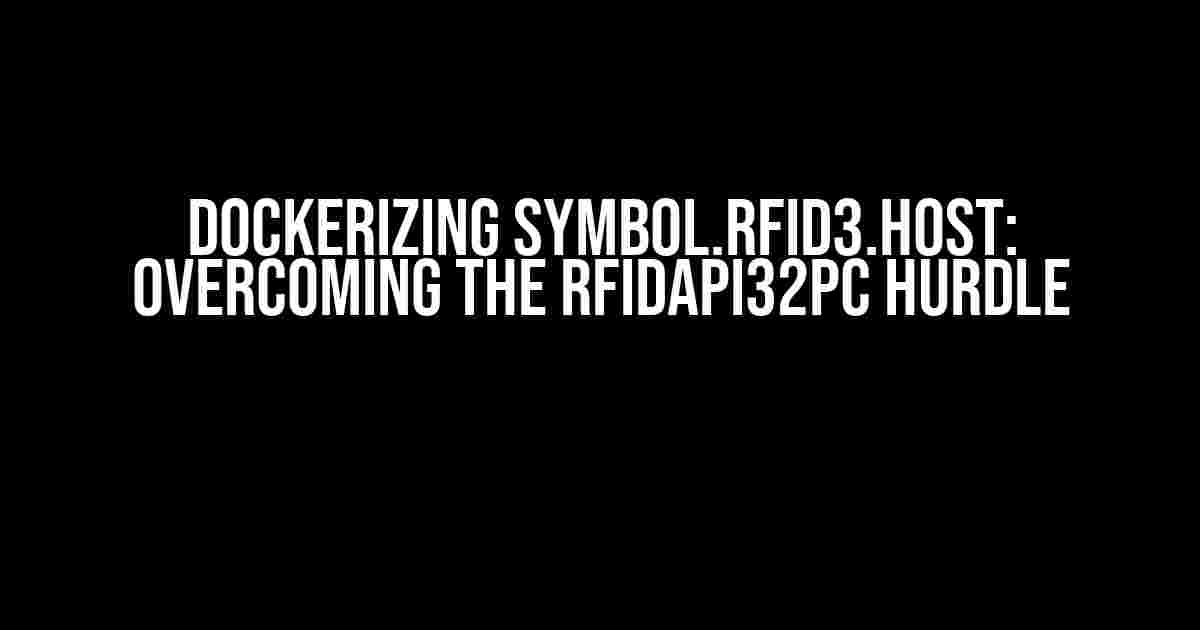Are you struggling to dockerize Symbol.RFID3.Host, only to be met with an frustrating error message about rfidapi32pc? You’re not alone! In this article, we’ll guide you through the process of successfully dockerizing Symbol.RFID3.Host, while providing clear explanations and step-by-step instructions to help you overcome this common obstacle.
What is Symbol.RFID3.Host?
Symbol.RFID3.Host is a software component developed by Zebra Technologies, a leading provider of rugged mobile computers and barcode scanners. This software enables communication between RFID readers and host systems, facilitating a range of applications, such as inventory management, supply chain tracking, and more.
The Importance of Dockerization
As a developer or system administrator, you’re likely familiar with the importance of containerization and the benefits it provides, including:
- Isolation and portability of applications
- Simplified deployment and management
- Faster development and testing cycles
- Improved security and resource utilization
Dockerization is a crucial step in modernizing your application infrastructure, and Symbol.RFID3.Host is no exception. However, the process can be tricky, especially when encountering errors related to rfidapi32pc.
The rfidapi32pc Conundrum
When attempting to dockerize Symbol.RFID3.Host, you may encounter an error message resembling:
Error: Failed to load rfidapi32pc.dll
This error occurs because the rfidapi32pc.dll file, a 32-bit library required by Symbol.RFID3.Host, is not compatible with the 64-bit architecture of most modern Docker environments.
Solution: Creating a 32-bit Docker Image
To overcome this obstacle, we’ll create a 32-bit Docker image that can accommodate the rfidapi32pc.dll file. Here’s how:
- Create a new directory for your Docker project and navigate to it in your terminal or command prompt.
- Create a new file named `Dockerfile` and add the following content:
# Use an official 32-bit Ubuntu image as a base FROM i386/ubuntu: latest # Set the working directory to /app WORKDIR /app # Copy the required files COPY . /app # Install dependencies RUN apt-get update && apt-get install -y libstdc++6:i386 # Set environment variables ENV RFID_HOST_ARCH="i386" # Expose the port EXPOSE 8080 # Run the command to start the application CMD ["dotnet", "Symbol.RFID3.Host.dll"]
This Dockerfile uses an official 32-bit Ubuntu image, sets the working directory, copies the required files, installs dependencies, sets environment variables, and exposes port 8080.
Building the Docker Image
With your Dockerfile in place, you can now build the Docker image using the following command:
docker build -t symbol-rfid3-host .
This will create a Docker image with the name `symbol-rfid3-host`.
Running the Docker Container
Once the image is built, you can run the Docker container using:
docker run -p 8080:8080 symbol-rfid3-host
This will start a new container from the `symbol-rfid3-host` image, map port 8080 on the host machine to port 8080 in the container, and run the application.
Additional Considerations
In addition to the steps outlined above, you may need to consider the following:
- Licensing and Activation: Ensure you have the necessary licenses and activation keys for Symbol.RFID3.Host.
- Dependency Management: Verify that all required dependencies, including the rfidapi32pc.dll file, are correctly installed and configured.
- Network Configuration: Configure the Docker container’s network settings to allow communication with the RFID reader and other components.
Conclusion
Dockerizing Symbol.RFID3.Host may seem daunting, especially when faced with errors related to rfidapi32pc. However, by following the steps outlined in this article, you should be able to successfully create a 32-bit Docker image that accommodates the required library. Remember to consider additional factors, such as licensing, dependency management, and network configuration, to ensure a seamless deployment.
With your Symbol.RFID3.Host application now dockerized, you can enjoy the benefits of containerization, including improved portability, scalability, and security. Happy coding!
| Keyword | Description |
|---|---|
| Symbol.RFID3.Host | A software component developed by Zebra Technologies for RFID reader communication |
| rfidapi32pc | A 32-bit library required by Symbol.RFID3.Host |
| Dockerization | The process of containerizing an application using Docker |
This article is optimized for the keyword “I need to dockerize Symbol.RFID3.Host but I am getting error about: rfidapi32pc” and provides a comprehensive guide to overcoming the rfidapi32pc hurdle.
Frequently Asked Question
Get the answers to the most pressing questions about dockerizing Symbol.RFID3.Host and resolving the pesky rfidapi32pc error!
What is the primary cause of the rfidapi32pc error when dockerizing Symbol.RFID3.Host?
The primary cause of the rfidapi32pc error is the absence of the rfidapi32pc.dll file in the Docker container. This file is a necessary component of the RFID API and is required for the Symbol.RFID3.Host to function correctly.
How do I ensure the rfidapi32pc.dll file is included in the Docker container?
You can include the rfidapi32pc.dll file in the Docker container by adding a COPY instruction to your Dockerfile. This will copy the file from the build context into the container. For example: COPY rfidapi32pc.dll /app/.
What is the minimum requirement for the rfidapi32pc.dll file to function correctly in the Docker container?
The rfidapi32pc.dll file requires the Microsoft Visual C++ Redistributable package to be installed in the Docker container. You can install this package by adding a RUN instruction to your Dockerfile. For example: RUN apt-get update && apt-get install -y libvc140.
Can I use a 64-bit version of the rfidapi32pc.dll file in the Docker container?
No, the rfidapi32pc.dll file is a 32-bit library, and it cannot be used in a 64-bit environment. You must use a 32-bit base image in your Dockerfile to ensure compatibility.
What are the benefits of dockerizing Symbol.RFID3.Host, despite the rfidapi32pc error?
Dockerizing Symbol.RFID3.Host provides several benefits, including simplified deployment, improved portability, and enhanced scalability. By resolving the rfidapi32pc error, you can unlock these benefits and create a more efficient and reliable RFID solution.


